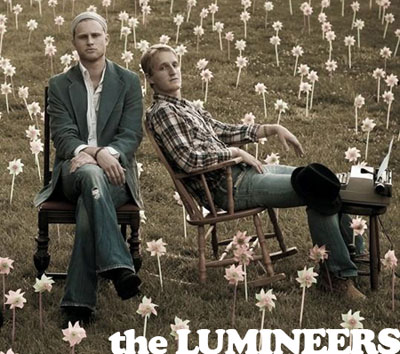




There is a magnetism between the education of process and humility. To learn how to trust in a creative process, whether as a solitary unit or yoked together with another creative mind requires a submission to the universe – a submission of ego. For where one initially believed their place in the world was always important, engaging in the creative process whittles that belief, or really, the ego’s wall – down – revealing a vast universe outstretching in all directions from one’s nose. If you can’t stand before that thought, that photograph, that song of the universe with any real humility, then you’re doing something wrong. Wrong or right, however The Lumineers found their way to Denver and their current sound is just fine by me. While many ears and hearts herald the act as one of the Queen City’s most promising in recent years, East Coast transplants Wesley Keith and Jeremiah are still a small secret to most of Denver and beyond. But not for long… The Lumineers’ self-titled EP, completed just after they landed in the Queen City, was an adroitly-named anthology of seven songs. On the first exhale, it is a shocking reminder of how complicated simplicity can be. On the second inhale, the album is, compositionally, an unspoiled marvel. The Lumineers’ (which is primarily Jeremiah and Wesley Keith, with Neyla Peckarek and others sitting-in) ability to arrange song textures while leaving enough space for the listener’s mind to swell and grow in the flower valleys is heartbreakingly refreshing. On this album, the wells of emotion and perspective that these boys have created is a source of illumination as much as it is a mirror for all those with ears to listen. Theirs are not songs so much as they are minimalist symphonies of human experience. They are sometimes more than songs: they are the hymnals that we all carry around behind our sternums, tucked away in-between the valves of our hearts. Call on them, and you will raise their silent souls into the universal song – that one which is banded together with cathedral light and the good news of remembrance. These are calculated sea swells of human history and emotion that often climax as gospel songs more than rock n’ roll tunes. In many songs there are the often-haunting watery, mariner moods that swirl and tease like a visual whirpool before, alas! The water explodes in volcanic jets of violence and collision, painting canvases in the sky of both of these men rejoicing in their holler and their big beat. And at the end of their beautiful explosions, everything – the protagonist, you and me and every instrument around us – ends up as a near-disaster, with all of our voices nearly-hoarse and all of our drums nearly-wrecked. As it should be. As it should be. Somewhere in every Lumineer song is a place where pure terror meets blissful wonder – the provenance of all our humanity. To this end, these are songs about everything bigger than us. These are songs that beg the universal for something like acceptance, or just a glimpse. For this author, this project is a grand accomplishment. For there is profundity in producing work this sophisticated, mature and at the same time, profoundly simple. But understand that it wasn’t always this easy. And, it’s still not.  On one hand, The Lumineers are a nearly complete Do-It-Yourself project. In New Jersey and Brooklyn, Wesley and Jeremiah grew the act out of sweaty want, drive and desire. They learned all the instruments, out of necessity. Their approach is hands-on. They record everything by themselves. They write everything together. They deliberate on every soundscape incessantly.
On one hand, The Lumineers are a nearly complete Do-It-Yourself project. In New Jersey and Brooklyn, Wesley and Jeremiah grew the act out of sweaty want, drive and desire. They learned all the instruments, out of necessity. Their approach is hands-on. They record everything by themselves. They write everything together. They deliberate on every soundscape incessantly.
On the other hand, The Lumineers are simply a band of brothers that are unwilling to compromise their talents, or sabotage their vision for expertise. No, on their first EP, there was no deferring of judgment. There was no producer. For worse, but mostly for better, The Lumineers’ decisions were brilliant all the way around. Evident in their final, delicately crafted songs is their process: the melody is the compass. The sound of song are the feet. Snatch the words from your life and work on them, knead them, need them, want them, sing them into their place. Give the song what it asks for. Learn your craft. Be a student of every craft you can. Learn another craft out of necessity. Then, sing and walk to the middle of your life carrying the songs in your heart just as the melody carries your words: straight to the light. The Lumineers stories are personal. They are first-person accounts of living and surging and walking with an uneven gait – sometimes with a limp and a swollen lip. Theirs are songs of growing into a bigger body, an older mind and a more sophisticated approach. These are stories of simple punches in the gut of truth. Simple. Truth. Classy girls girls don’t kiss in bars you fool… Wesley Keith’s love of words are a towering crane of power in The Lumineer’s songs. His ability to find a big melody and then work and whittle that wood into the shape of not only words, but phrases – meaningful and colorful phrases – impactful truisms and ageless worlds of wisdom, is supremely delightful. I don’t own a single gun/If I did, you’d be the one/To hold it, aim it, make all of the bad, then run/But I don’t own a single gun. I don’t have a sweetheart yet/If I did, I’d break my neck. Intriguing it is that the band began from such a different place, such a different sound. Three years ago and the band was much darker. They were much more complicated to wrap your arms and ears around. Their expectations once were of bringing the listener to them and their complicated chord structures and movements. But The Lumineers did something that very few people give themselves a chance to do: critique themselves. Critique everything about themselves. Drop the ego and create a truthful picture of what their strengths and weaknesses are as musicians, and probably, as humans. This lead the band to create a completely different sound thesis and image. One of the important fulcrum points came from a song that Jeremiah wrote, “Darlene”. The song begins as a sparse confession, mirroring that emptiness with a simple refrain of, “Darlene, darling.” I give you my ring, in your shaking hand/You give me a sting, with your crazy plan Slowly, the piano rises from one corner. Then the drums come rollicking-in over the millions of desolate acres of sea. And then the wind picks-up and suddenly, we’re flying. We’re dipping elegantly up and down over our emotional landscapes – then, we beat down, hard into the canyons and darkened night of our fear. And then, we wake. We rise. The dream is over… “Darlene” in so many ways sets the touchstone, the foundation, the standard for what The Lumineers have become. Where Jeremiah and Wesley were once a band that thought the audience should come to them – they have since busted that thesis and that wall, down. Now, Jeremiah steps-out from behind the drums, picks-up a xylophone and along with Wes and Neyla they stand in a circle, busking-style, and sing “Darlene”. Nay, they fucking howl “Darlene”. And we all follow suit. Certainly, this is about confidence. But confidence only comes after making the tough decisions: eliminating the distractions. Calling on your self. Becoming a better man. And yes, humble yourself to all of this. Humble yourself to what you’ve been called to do. Then, do it. Now. Do it: www.myspace.com/thelumineers |









